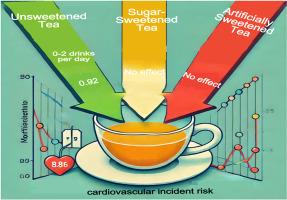Association of unsweetened and sweetened tea consumption with risk of incident cardiovascular disease: Evidence from the UK Biobank
IF 2.1
Q3 PERIPHERAL VASCULAR DISEASE
International Journal of Cardiology Cardiovascular Risk and Prevention
Pub Date : 2025-05-29
DOI:10.1016/j.ijcrp.2025.200442
引用次数: 0
Abstract
Background
The impact of tea consumption, particularly the differences between sweetened and unsweetened tea, on the risk of cardiovascular disease (CVD) remains underexplored. This study investigates the associations between the consumption of unsweetened, sugar-sweetened, and artificially sweetened tea and the incidence of CVD.
Methods
We included 177,810 participants from the UK Biobank, with a median follow-up period of 12.7 years. Cox proportional hazards models were utilized to assess the associations between tea intake and the risk of CVD, coronary artery disease (CAD), stroke, and heart failure (HF) incidents. Additionally, we investigated potential interactions with polygenic risk scores (PRS) for CVD.
Results
During the follow-up period, 15,003 cases of incident CVD were recorded. A U-shaped association was identified between unsweetened tea consumption and CVD risk, with the lowest risk observed at a consumption level of 0–2 drinks/day (HR: 0.92, 95 % CI: 0.87–0.97). In contrast, no significant associations were found for sugar-sweetened or artificially sweetened tea. The reduced CVD risk associated with unsweetened tea was consistent across various subtypes, including CAD, stroke, and HF. Additionally, no significant interactions were observed between tea consumption and PRS.
Conclusions
Consuming unsweetened tea is associated with a reduced risk of incident CVD, CAD, stroke, and HF. In contrast, no significant associations were observed for sugar-sweetened or artificially sweetened tea. These findings indicate that unsweetened tea may contribute positively to the prevention of CVD, independent of genetic risk factors. Further research is needed to validate these results and explore the underlying mechanisms.

无糖和加糖茶与心血管疾病发生风险的关联:来自英国生物银行的证据
茶叶消费的影响,特别是加糖茶和不加糖茶之间的差异,对心血管疾病(CVD)风险的影响仍未得到充分研究。本研究调查了饮用不加糖、加糖和人工加糖茶与心血管疾病发病率之间的关系。方法:我们从英国生物银行(UK Biobank)纳入177810名参与者,中位随访期为12.7年。采用Cox比例风险模型来评估茶摄入量与心血管疾病、冠状动脉疾病(CAD)、中风和心力衰竭(HF)事件风险之间的关系。此外,我们还研究了CVD与多基因风险评分(PRS)的潜在相互作用。结果随访期间共发生心血管疾病15,003例。无糖茶的摄入量与心血管疾病风险之间呈u型关系,每天饮用0-2杯茶的风险最低(HR: 0.92, 95% CI: 0.87-0.97)。相比之下,加糖或人工加糖的茶没有发现明显的关联。与无糖茶相关的心血管疾病风险降低在各种亚型中是一致的,包括冠心病、中风和心衰。此外,没有观察到茶叶消费与PRS之间的显著相互作用。结论:饮用无糖茶可降低心血管疾病、冠心病、中风和心衰的发生风险。相比之下,加糖或人工加糖的茶没有明显的关联。这些发现表明,不加糖的茶可能对预防心血管疾病有积极作用,独立于遗传风险因素。需要进一步的研究来验证这些结果并探索潜在的机制。
本文章由计算机程序翻译,如有差异,请以英文原文为准。
求助全文
约1分钟内获得全文
求助全文
来源期刊

International Journal of Cardiology Cardiovascular Risk and Prevention
Cardiology and Cardiovascular Medicine
CiteScore
3.00
自引率
0.00%
发文量
0
审稿时长
72 days
 求助内容:
求助内容: 应助结果提醒方式:
应助结果提醒方式:


